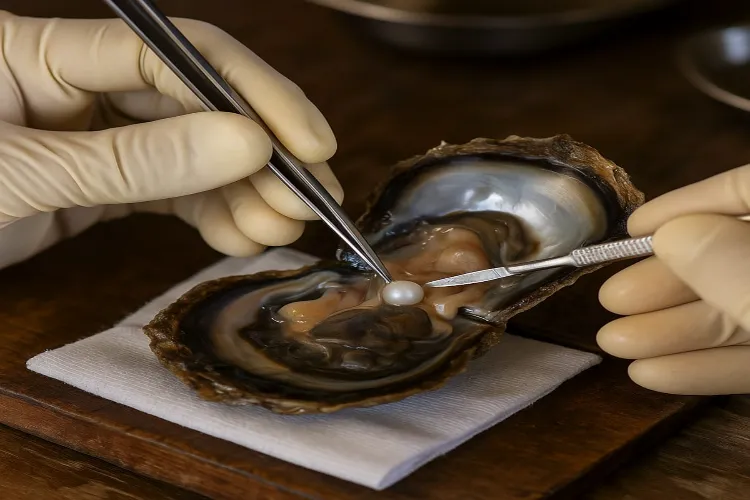
New Delhi
Even the best of human-developed technologies cannot match nature, says marine biologist and Padma Shri recipient Ajai Kumar Sonkar, whose experiments show that oysters cultivated in a scientifically advanced, yet controlled environment struggled to survive, compared to those grown in a natural one.
Two species of pearl oysters -- Pinctada margaritifera and Pteria penguin -- were obtained from the Andaman islands. One group was cultivated in a controlled, artificial environment -- developed using scientific technologies -- and the other in a natural sea environment, the marine biologist explained in an article published in the May issue of the fisheries magazine 'INFOFISH International'.
Sonkar found that in the first group, just over half survived, and most of the pearls harvested were irregular, blemished, and structurally weak.
However, of those cultivated in the natural sea environment -- rich with native microorganisms and beneficial bacteriophages -- almost all the oysters survived, with nearly three in every five of the 119 pearls harvested being of the highest quality.
In a telephonic interview with PTI, Sonkar said, "Even the best technology developed by humans cannot match the normal processes of nature."
Contrasting the environments in which the oyster species were grown, the biologist said the controlled environment featured precise biofiltration, a mechanical water flow, along with regulated alkalinity and temperature, and a limited contact with microbes.
Further, the oysters were fed with microalgae cultivated in Walne medium -- widely used for growing marine algae, Sonkar said.
The natural seawater, however, provided a self-regulating, immune-boosting, and biologically intelligent ecosystem, comprising microbial diversity, invisible phages, live phytoplankton, and a subtle biogeochemical balance, the 58-year-old said.
The oysters also received continuously flowing unfiltered seawater drawn from natural depths.
Sonkar said, "No laboratory, no simulation, however advanced, can replicate the holistic intelligence of nature," Sonkar said, describing the different outcomes from the experiments as a "deep revelation".
He added, "Where we filtered, nature added diversity. Where we controlled, nature adapted. Where we sterilised everything, nature built immunity."
The scientist was recognised with the civilian award 'Padma Shri' in March 2022 for his contributions to the field of aquaculture, specifically in developing pearl-making techniques using tissue culture.
Learnings from the experiments are not confined to pearl culture alone -- they challenge the global scientific approach itself, Sonkar said.
"(The discovery) forces us to reconsider how far we've drifted from nature, be it in soilless agriculture, cities disconnected from natural cues, or children raised in sanitised digital bubbles," the biologist said.
Sonkar graduated from Kakatiya University, Warangal, in 1990-91. He went on to acquire knowledge online across scientific fields, including genetics, nutrition and cancer, from Rice University and Harvard Medical School in the US, among others in Japan and The Netherlands.
About the experiment results, Sonkar continued, "What my oysters showed is what we must now remember: Nature is not our assistant. It is our origin. It is our greatest engineer."
The naturally present bacteriophages which the second group of oysters was exposed to are the same microscopic guardians that maintain microbial balance, he said.
"These phages do not cause disease. They are precise tools of life, invisible, yet indispensable," he stressed.
"Despite being provided with the most scientifically advanced controlled environment, in the absence of natural challenge, diversity, and complexity, the first group of oysters could not fully develop," Sonkar said.
He hopes the study to not be seen as a mere technical success, but a "philosophical awakening" -- one reminding us to revere the unmatched wisdom of nature, which is today's most urgent scientific need.
READ MORE: 10 Muslim personalities who shaped Indian film industry
"Because when nature is not restrained, it performs at its best -- and it surpasses us all," Sonkar said.
